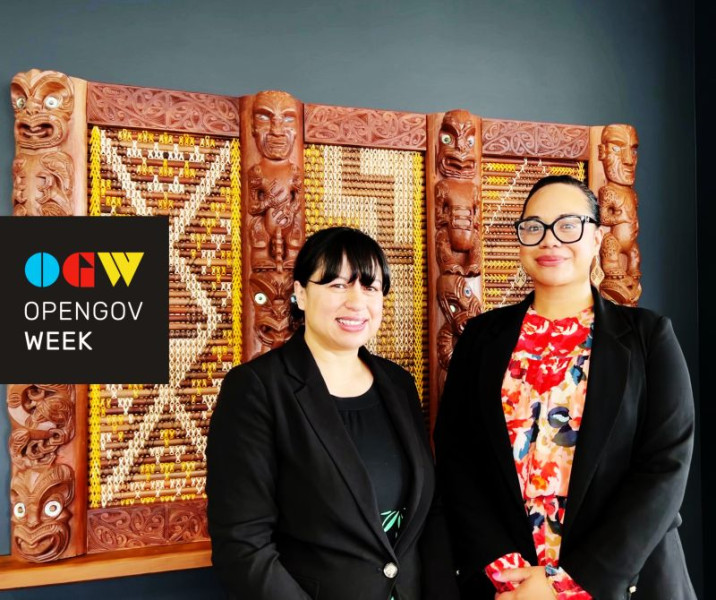Co-create, collaborate and contribute for government transparency
Co-create, collaborate and contribute for government transparency

(Picture caption: During Open Government Week 2023, the Ministry for Pacific Peoples' Marisa Maepu and Koula Kutu shared a case study with Te Kawa Mataaho Public Service Commission about the Ministry's COVID-19 response for Pacific communities.)
Co-create. Collaborate. Contribute. These three actions were the focus of Te Kawa Mataaho Public Service Commission during this year’s Open Government Week (OGW).
Taking place from May 8-12 and hosted by the Open Government Partnership (OGP) International, Aotearoa New Zealand was one of 75 participating countries around the globe which celebrated OGW.
Te Kawa Mataaho Public Service Commission Manager, Open Government, Integrity Ethics and Standards Dean Rosson says open government is about strengthening democracy, building trust, and improving wellbeing by ensuring people can contribute and influence what government does, and how it does it.
“Open Government Week is about building the trust and confidence of the public in the public service - greater trust and confidence leads to increased engagement and participation, and it is something the Public Service Commission wants to encourage,” Dean says.
He explains the Public Service Commission is the central public service department of New Zealand charged with overseeing, managing, and improving the performance of the state sector of New Zealand and its organisations.
“Our vision is to provide a trusted public service that serves all of Aotearoa New Zealan, and the role of my team is to support this vision through initiatives to build the trust and confidence of the public in the public service.”
A key component of Dean’s role is coordinating with the OGP, which is an international agreement by governments to create greater transparency, increase civic participation and use new technologies to make their governments more open, effective, and accountable.
“A key deliverable of this work is a National Action Plan (NAP) which contains commitments or initiatives co-created by agencies and civil society to support the goals of the partnership,” Dean says.
Dean says another important aspect of the role is OIA requests.
“The team manage the six-monthly reporting of Official Information Act (OIA) request reporting, provide agency training via OIA forums in partnership with the Ombudsman’s office, and promote good practice.
“We also report on proactive release of OIA requests and Cabinet papers.”
During OGW, Dean and his team took the opportunity to highlight some of the good work being done to create greater transparency throughout government.
“For this week we wanted to focus on citizen participation in problem solving, and the work of the Ministry for Pacific Peoples (MPP) as part of the response to COVID-19 was a great example of this.
“COVID-19 had a significant impact on Pacific people in Aotearoa and initially vaccination rates were lower than average.
“When MPP realised this problem could not be solved by government agencies alone, it enlisted the help of the community to design and deliver services.
“The result being increased awareness, vaccination rates and ultimately people saved - this would not have occurred without the trust and confidence of the community.”
Participation and engagement of citizens in problem solving is essential for complex and challenging issues, Dean continues.
“It allows those directly affected by policies or service design to become involved in the design and delivery of products and services.
“This can only be achieved when there is a trusting relation between agencies and the citizens engaged with - hence the need to build trust beforehand.”
The OGW allows this trust to grow, and for greater visibility of what is happening across government.
Visit the Open Government Partnership and Te Kawa Mataaho Public Service Commission websites for more information.
